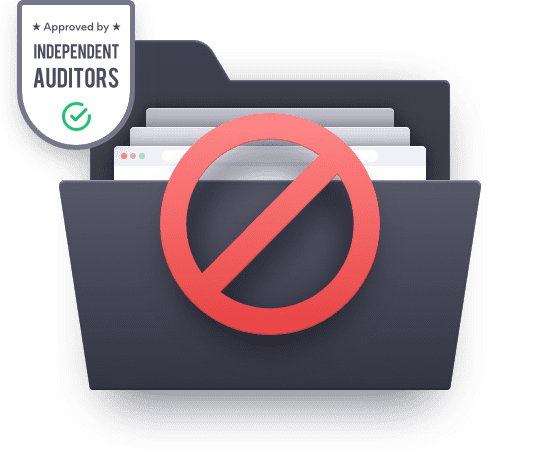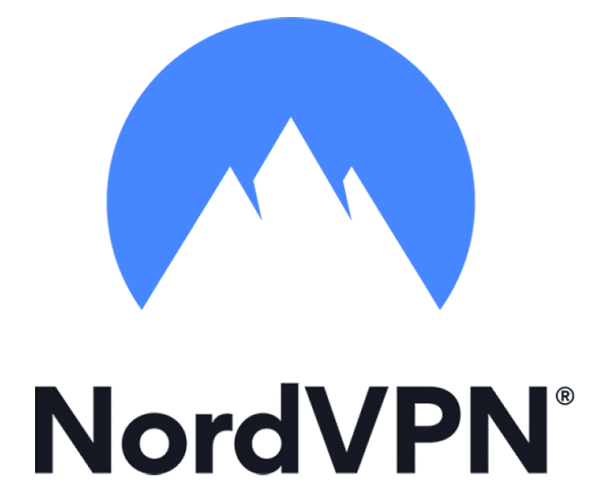Best No Log VPN Providers
The best no-log VPN providers offer complete anonymity, privacy and peace of mind for users by keeping ZERO logs on user activity and connections when using their VPN. These VPNs also offer the best features, speed, price and experience. We tested over 150 VPN providers to create our list of the top 5 No Log VPN providers.

Top 5 No-Logging VPNs
- Unlimited bandwidth and speed
- 5,224 servers in 60+ countries
- 6 Simultaneous Connections
- Strict No Logs Policy / Based in Panama
- 45 Day Refund Policy
4.9
- Unlimited Bandwidth & No Speed Limits
- 3,000+ VPN servers in 94 countries
- 5 Simultaneous Connections
- No Logging VPN / Based in British Virgin Islands
- 30-day Money-back Guarantee
4.9
- Unlimited Bandwidth & No Speed Limits
- 3,200+ servers in 65 countries
- Unlimited Simultaneous Connections
- No Logging | Based in British Virgin Islands
- 30-Day Money Back Guarantee
4.8
- Unlimited Bandwidth & Speed
- 7300+ servers in 91+ countries
- 7 Simultaneous Connections
- No Logging & Outside of 7 Eyes
- 45-Day Money Back Guarantee
4.7
- Unlimited Bandwidth & No Speed Limits
- 3,000+ Servers in 78+ countries
- 5 Simultaneous Connections
- No Logging & Accepts CryptoCurrency
- 30-day Money-back Guarantee
4.6
What Makes The Best No-Logging VPN Provider
When you’re connected to a VPN, your ISP cannot see what you’re doing or what websites you visit, and those websites can’t see where you’re located — but your VPN can know everything. If your VPN keeps logs (and most VPNs do), they’ll have a record of everything you do, every website you visit and a history every IP Address you connected along with when you connected to them.
If you want privacy and anonymity — choosing and using a VPN that does not log any data is important. Here’s our criteria for the top no-logging VPN providers and why they’re important:
- No Activity Logs — We make sure VPNs do not log activities, which is basically like your browser history. No activity logs means VPNs won’t keep any records of the websites and services you access.
- No Connection Logs — These logs can tell what server & IP address you used and when you used it. Some VPNs only promise to keep conneciton logs but this can be a big issue as a law enforcement agency, judge or threatening email can request this info and unmask you. We make No Logging VPNs don’t log anything, including connection data.
- Privacy-Haven Jurisdiction — Another big threat to your anonymity is what country the VPN you use is based out of. If your VPN is located in the US, UK, Canada or any other nation in the 14-Eyes Alliance — surveillance agencies are likely accessing your VPN activity and logging everything separately. This should be illegal but you know, the DEEP State assumes they’re above the law. Special thanks to Edward Snowden for telling the world about this.
- Anonymous Payments — Last but not least, the best No Logging VPNs accept anonymous payment options such as Crypto and Gift Cards. While this isn’t as important as the first three, how you pay, at the very least, can tie your real identity to your VPN account. Using an anonymous payment option can ensure your VPN has no concrete data or log associating you with them.
Only VPN providers that meet these factors are considered a No-Logging VPN. This elimiates over two-thirds of all VPNs from the running and finding the Best VPN among the real no-logging VPNs comes down to the regular factors — features, network, reliability, speed, policies and pricing.
FAQ for No-Logging VPNs
Why should I buy a no-log VPN?
Increased anonymity is the main reason to buy a no-logs VPN. Aside from hiding your Internet sessions, the providers do not record or store your traffic data. Since there is no available traffic data of you, it becomes harder for third parties to identify you based on your online activities.
Using a no-logs VPN also safeguards your online privacy. Note that anonymity and privacy are two distinct but interrelated concepts. Privacy refers to your ability to keep information about your activities to yourself while anonymity is all about keeping your identity hidden.
With a no-logs policy, third parties can’t compel your VPN provider to share your activity data since there is no data to show. The issue of privacy is often associated with judicial processes like investigations and government monitoring, but it also plays an important role in your effort to get away from annoying advertisers.
The no-logs policy ultimately ties to the level of security a VPN provider can give. It helps the provider protect customers against potential data breaches on its side. The policy also prevents the company’s personnel from accessing and misusing your data.
Are there really VPNs that don’t log any information?
Yes, there are several listed above, but we need to be clear how these providers implement such a policy. VPN companies record user logs for a variety of purposes, such as monitoring their systems or tracking data consumption of users enrolled in fixed-data plans. The no-logs policy concerns what providers do to the information after the intended purpose is completed.
True no-logs VPN providers will automatically delete your activity information after your current session ends. The deletion time can be anywhere from a few minutes to a few hours. Other companies claiming to have no-logs policies might actually hold on to your information for a longer period before actual deletion.
How do I easily find no-log VPNs?
Since you won’t always be able to determine whether a provider really has a no-logs policy at a glance, reading our reviews above will be helpful. Instead of just relying on the info provided on their websites, we reach out to the providers themselves to determine how their policies work. We also collect user reviews to determine the consensus on whether these no-logs policies really work, and keep abreast of the latest news on whether or not a provider has been truthful.
How do I know that a no-logs VPN really doesn’t store my information?
To determine whether a VPN provider doesn’t store your activity logs, first review its policy statements. A good no-logs VPN would often have a separate page dedicated to explaining such a policy. The company will tell you in detail which types of information it collects, for what purposes they use the information, and exactly how long it holds the information.
You should also look for warrant canaries found in providers’ sites. These are declarations saying that the company has not been given by authorities a warrant to hand over data. Warrant canaries serve as a good indicator that the company has not yet been subject to scrutiny. Do keep in mind that this is not an assurance that the company will not hand over information if requested.
Location is another consideration. The best options here are providers that are based in countries that do not require VPN companies to keep logs. Those based in countries like the US, where authorities frequently request for information about people’s online activities, are likely to have less effective no-logs policies.
Don’t forget to monitor the news reports about providers that hand over information. While your current provider might not be one of them, such reports can indicate a trend that could affect its no-logs policy in the future. Be sure to get updates from your provider regarding these policy changes.
What information, if any, do VPNs keep on their logs?
There are three types of logs that a VPN provider might collect from you, namely:
- General information logs: These contain your customer profile, including your name/username, email address, purchase history, and payment details.
- Connection logs: They contain the information about your session, including the timestamp of your session, the VPN server you used, and even your real IP address.
- Activity/traffic logs: These logs provide the actual details of your VPN traffic, including the sites you visited and applications you used.
Of the three, the activity and connection logs are the ones that you don’t want your provider storing for a prolonged period. Even your IP address and timestamp can give leads to third parties like advertisers and hackers.
Note that some providers claiming to have a no-logs policy might also state that they still keep your general information on file for billing. This does not invalidate the claim, but you should still inquire how they store information as part of their general security protocols. The provider should also detail how it handles your information after you cancel your subscriptions, like how long it takes for them to delete your information completely. We cover many of these things in our reviews above
Will a no-log VPN be able to keep my torrenting activities hidden?
Yes. The no-logs policy of a VPN provider ensures that there are no records of your torrenting activities, keeping it completely private. Do note that not all providers offer the two together. Some might discourage torrenting to avoid the legal issues associated with such activity. Check out our reviews to find out the no-logs VPNs that provide full support for P2P use.
How does minimal logging of information help my online privacy?
Even if having zero logs is the best option to go with, letting your VPN provider collect a minimal amount of information has benefits, like:
- Increased performance: Providers can improve and optimize their servers and network connections based on users’ activity data.
- Greater reliability: VPN providers use activity and connection logs to detect and quickly fix low-level system issues and prevent outages.
- Customized user experience: Logs help your provider determine your specific connection needs and give you the appropriate solutions.
- Deal with malicious users: Providers use logs to track scammers, hackers, and other malicious groups misusing their networks, and remove them.
These benefits help ensure that the VPN you use will remain secure and effective in protecting your online traffic.
We do need to emphasize the word minimal here. The provider must be clear about the specific information it collects and the intended purpose for each information. The provider should also have an immediate deletion policy to ensure that your information won’t be stored in their servers.
How can I use no-logs VPNs for gaming?
Since gamers often use VPNs to go around the region-lock restrictions on certain online games, or play on the server as friends for decreased latency issues, publishers have become stricter with the practice. This could result in a publisher banning you from the game network if you’re caught. You can take advantage of the provider’s no-logs policy to ensure that there are no traces of your activities and avoid that ban.
How long do VPNs keep their logs?
The amount of time VPNs store your logs varies between providers. True no-logs VPNs will delete your data within a few minutes after your session ends. Some might store your data for 24 hours. Avoid VPNs that store logs for more than a few days.
You also need to watch out against logs recycling. This is the practice of deleting only a portion of your data during the permitted deletion period. For example, if the provider has a logs storage period of seven days, it might only remove your first-day data on the eighth day. It lets them hold on to your data longer than the prescribed periods. Do your research and read our reviews above right now to find out which providers engage in this practice.



